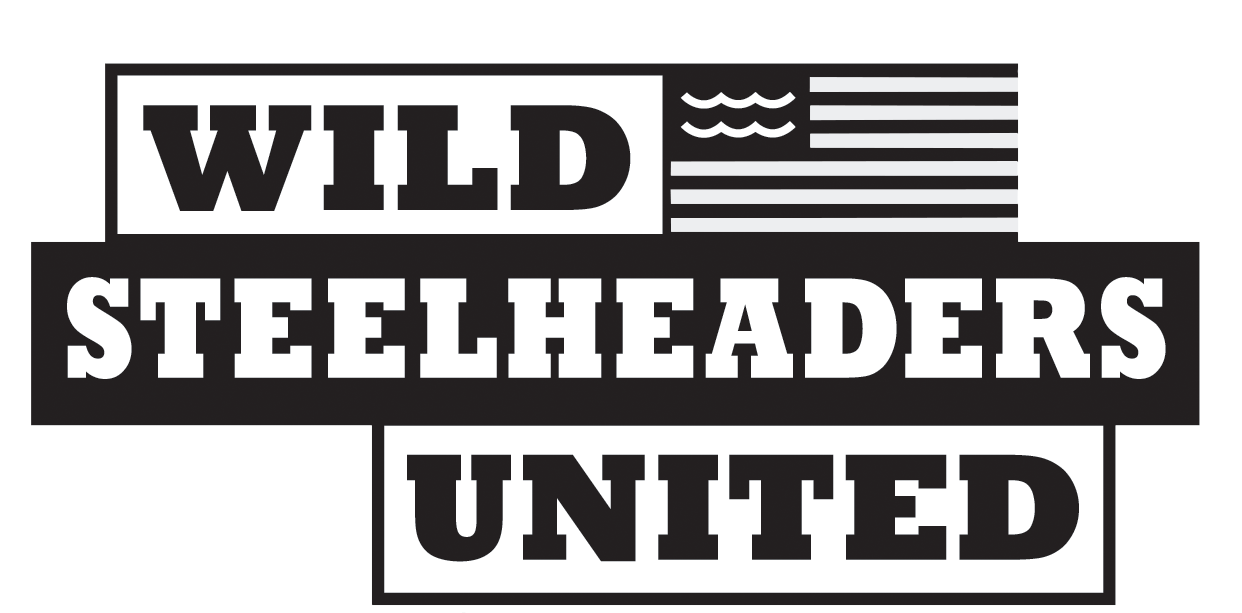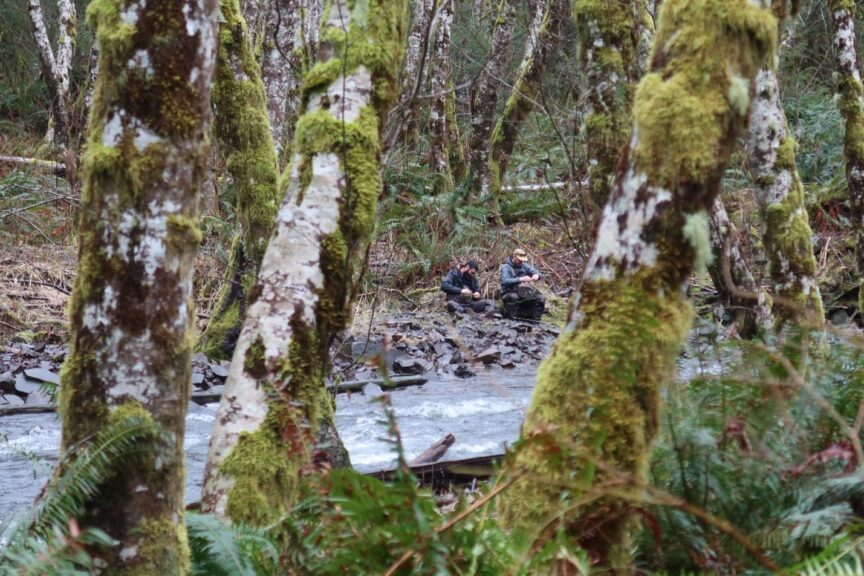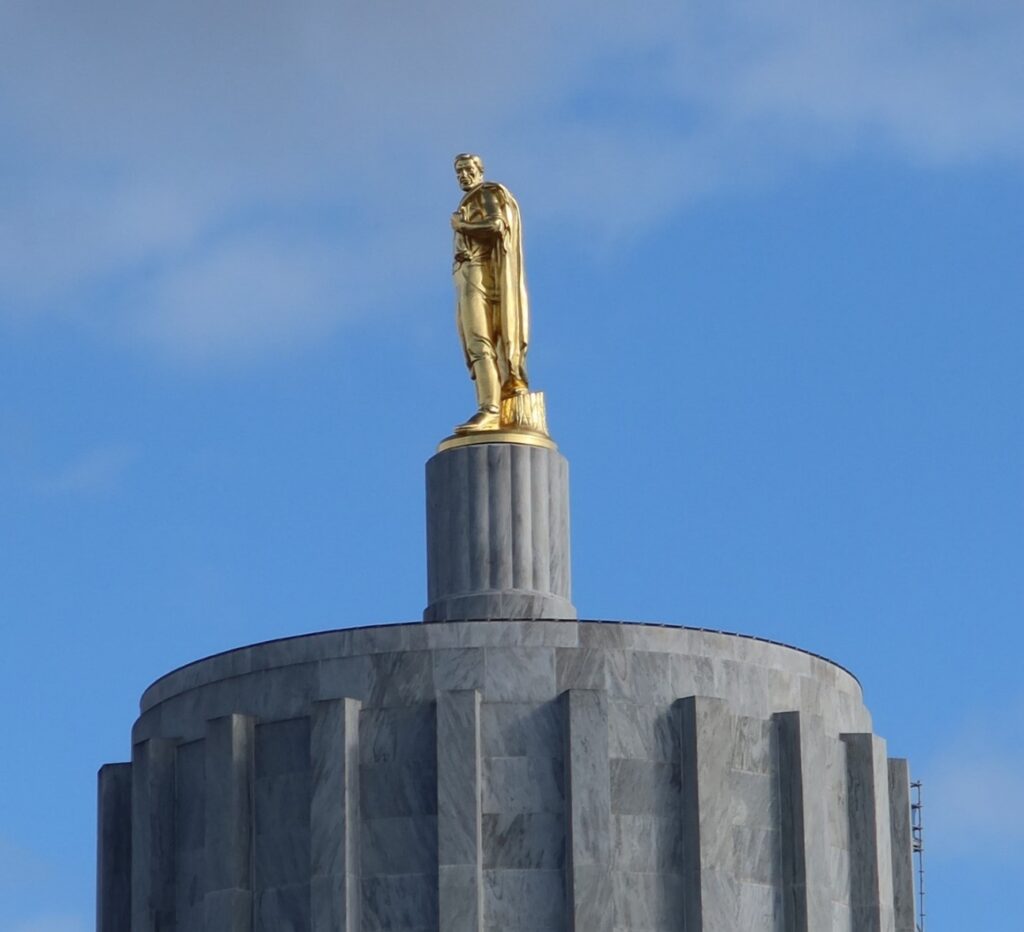
The Oregon Legislature wrapped up its 2025 legislative session on June 27th. Trout Unlimited is pleased to report that the Legislature passed some important policy and budget measures for fish and rivers this year, though an important update to Oregon’s water code stalled out in the final days of session. As in previous years, we effectively defended against some counter-productive natural resource bills, too.
New pathway for river “navigability” determinations (a win for public access!)
Senate Bill 74 creates a new pathway for Oregon to declare waterways as “navigable,” which has important implications for the public’s rights to access and enjoy Oregon waterways.
Under the archaic—but important—equal footing doctrine, states received ownership to the areas of streams and rivers below the “ordinary high water mark” (OHWM) in channels used for commerce (or capable of use in commerce) at the time of statehood. In areas the state owns below the OHWM, the public trust doctrine obligates the State to act as a fiduciary in protecting the public’s rights to use and enjoy the waterway. The State can also collect revenues for activities licensed or permitted on navigable submerged lands.
Oregon has only formally determined the navigability of a handful of rivers, which creates uncertainty for the public about rights to access and enjoy Oregon rivers (e.g., wading below OHWM or anchoring boats in the channel for recreational pursuits) because on many streams landowners and members of the public may have different understandings about who owns the submerged area. Navigability determinations are typically a costly process for the State, but SB 74 creates a new and more efficient option for the State to conduct navigability determinations when landowners and the State agree about which areas should be officially determined and mapped as state-owned. TU played a key role in supporting SB 74.
Funding secured for agencies’ fish and water programs
This year, the Legislature was responsible for building the budgets for all agencies in the 2025-2027 biennium. That’s an essential topic for natural resource agencies. TU strongly supported proposals to fund important fish monitoring programs and implementation of the Private Forest Accord at ODFW, and supporting core programs related to good water management at the Water Resources Department (WRD).
We’re pleased to report that ODFW and WRD mostly maintained funding for their core fish and water programs—with some new funding for TU priorities including fish screening capacity and fish reintroduction monitoring in the Klamath River basin (to ensure a positive ecological response to dam removal and watershed restoration efforts).
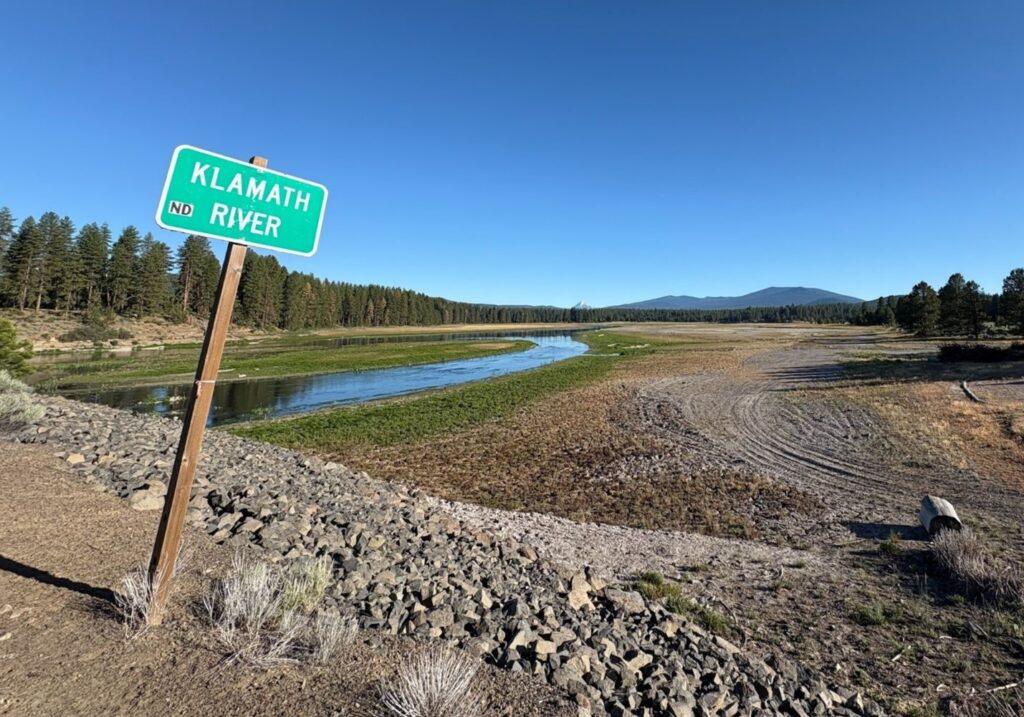
Image: Bryant Atanasio
Stalled Out: water code update to protect fish
TU placed a high priority this session on passing a bill that would update the state’s water laws to account for the ecological needs of steelhead and other native salmonids. Unfortunately, it did not pass the session—but we are pleased to have received multiple hearings on the issue during the session and intend to keep advocating for the updates.
Currently, if someone wants a new water right, the State reviews that application for effects on the “public interest” (a broad inquiry regarding harm to fish, water quality, etc.). However, there is no such review for applications to change existing water rights.
For example, moving a canal headgate location further upstream on a river might diminish streamflow between the old location and the new one—with related effects on fish—but the State cannot consider or account for those impacts under current law.
Any requested change to a water right is called a “transfer,” and the State does not conduct an environmental review or public interest review of water right transfers. TU and our allies in the Oregon Water Partnership brought Senate Bill 427 this year with the support of Senators Floyd Prozanski and Jeff Golden to close that loophole, and Governor Tina Kotek brought a similar bill (SB 1153) that would also address the problem. Opposition groups introduced their own bill that would expressly prohibit the State from considering the public interest in reviewing proposed changes to water rights (HB 3501).
After 2 months of weekly negotiations, the Governor’s bill SB 1153—which would also establish a tribal consultation process for water right transfers—began moving through the Senate. It passed out of Committee in the Senate but did not receive a Senate Floor vote. TU supported SB 427 and SB 1153 and opposed HB 3501.
(For additional background see Oregon Water Partnership’s 2025 session press release.)
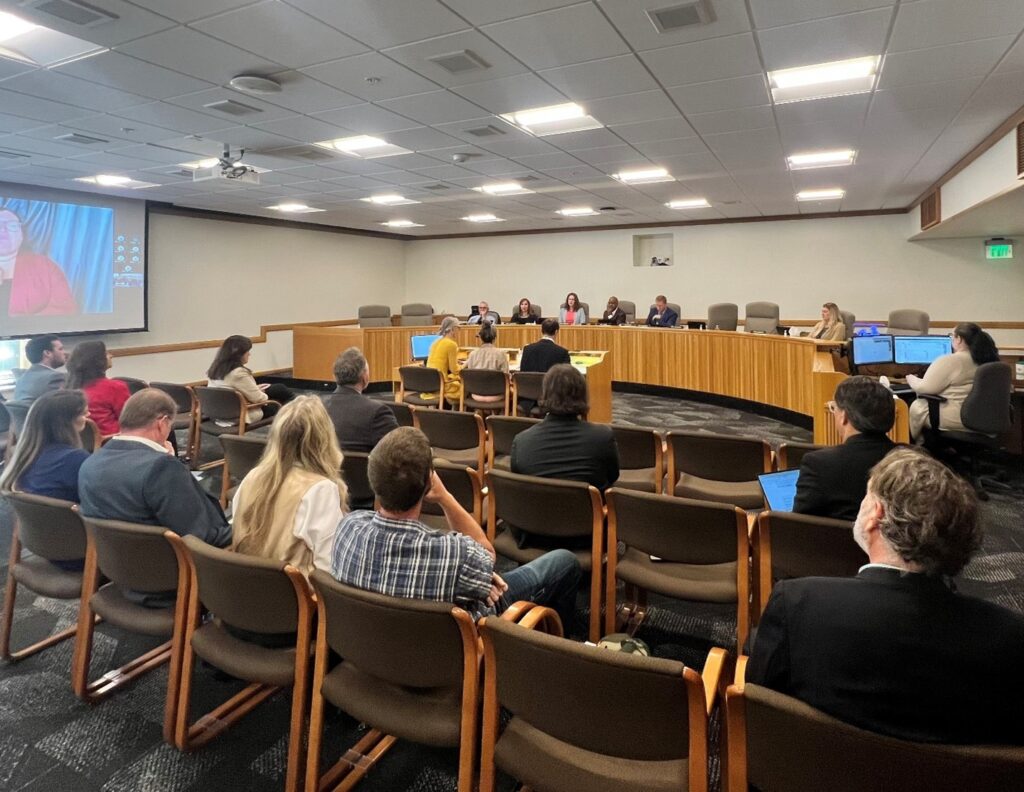
More check stations and funding for aquatic invasive species (AIS) defense
Invasive species present tremendous conservation concerns for native fish species. They can also create major headaches for the agriculture, municipal, and industrial sectors because invasive mussels and aquatic plants clog pumps, damage motors, and increase cleaning and operational expenses.
In an effort to guard against AIS entering Oregon’s waterways, our state has a network of AIS boat check stations. We need more to make sure that infested boats don’t enter Oregon waters. Until the 2025 session, existing law required that the Oregon Department of Fish & Wildlife (ODFW) or the Oregon State Marine Board (OSMB) manage AIS check stations, but there are other organizations, such as irrigation districts, that have been interested in checking boats to prevent introduction of invasive mussels and other problematic species into their facilities.
House Bill 2170 expands the list of entities authorized to run AIS check stations and decontamination stations in Oregon, which will hopefully increase the number and presence of these facilities. House Bill 2982 nominally increases boat registration fees in Oregon and directs that new revenue to the State’s AIS Prevention Fund. TU members in Oregon supported both bills.
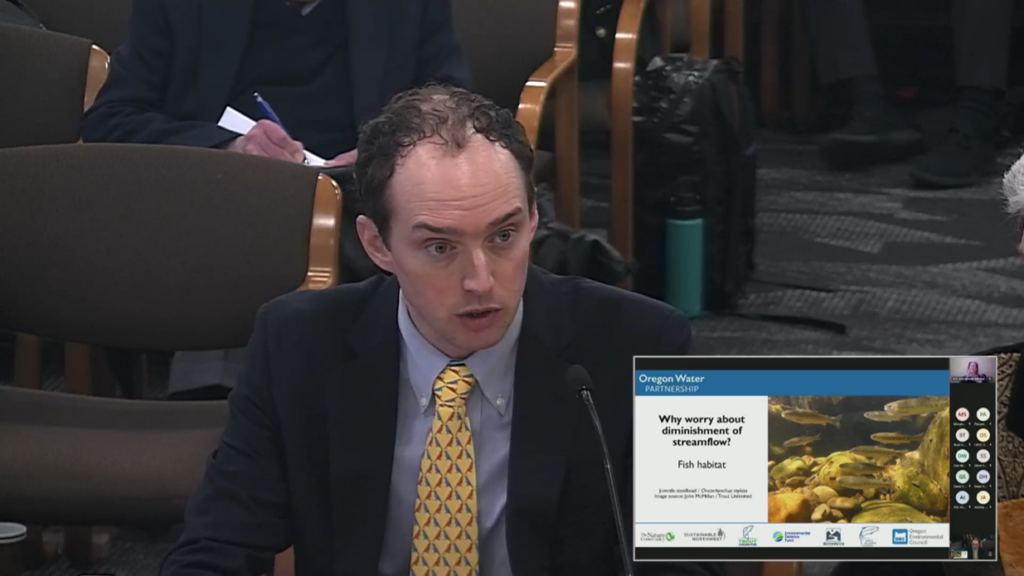
Disability permits for recreational fishing
House Bill 2163 allows certain individuals with intellectual disabilities to purchase “disability permits” for recreational fishing and shellfish harvesting.
Under the recreational angling and shellfish harvesting laws, individuals generally must physically hold and operate their own fishing rods, reels, clam guns, and other equipment. Existing law has only allowed an exception to this for certain physical or military service limitations.
Unfortunately, that framework has prevented some people (who cannot operate gear or equipment without assistance) from participating in fishing or clamming. HB 2163 will make a meaningful difference for folks that want to engage in treasured outdoor pastimes such as fishing, but who’ve been limited from doing so by an unfair (albeit, unintended) limitation in statutes. TU supported HB 2163.
Defense: bad bills that died
This session, TU once again played a key role in opposing bills that would degrade fisheries, fish habitat, and water quality.
Senate Bill 301 would have gutted a law that caps the size of boats which may tow water-skiers and wakeboarders in the Willamette River upstream of Willamette Falls (a key migratory corridor for ESA-listed spring Chinook and winter steelhead, plus coho salmon and Pacific Lamprey).
In 2022, the Legislature capped the size of boats that can engage in certain activities in the river and prohibited all wake-surfing in the “Newberg Pool” of the Willamette—due to many years of conflict over streambank erosion, harm to listed salmon and steelhead, and private property damage. For the third year in a row, we successfully opposed a proposal to unwind that reasonable, existing framework (see TU testimony on SB 301 here).
We also opposed proposals that would’ve made it easier to destroy functioning salmon habitat by creating a new and unproven wetland-fill mitigation program (Senate Bill 511, also known as “salmon credit”) or legislatively overruled the ODFW Commission’s decision in 2022 to end the North Umpqua hatchery summer steelhead program (Senate Bill 512 as introduced; see letters of opposition from Eugene Chapter TU here and Corvallis Chapter TU here).
In Brief: other bills in the mix
TU engaged in a number of other policy measures with implications for salmon and steelhead:
- Senate Bill 221 directs ODFW to establish a new fall Chinook salmon “hatchbox” program in Coos County. TU opposed early versions of the bill which weren’t limited to Chinook and didn’t include monitoring or reporting requirements, but we negotiated with the bill’s supporters on refinements to the concept and we ultimately did not oppose the version that passed.
- Senate Bill 761 creates a new instream flow restoration program in the Walla Walla River basin, and TU supported it.
- House Bill 3362 would have implemented a sales tax on tires and directed revenues to several programs, including efforts to clean stormwater and reduce loading of 6ppd-quinone (a toxin that kills coho salmon in urban areas as they return with the first fall rains). The Oregon Council of TU supported the bill and used the opportunity to educate legislators about the risks and effects of 6ppd, but the bill didn’t pass.
- House Bill 2345 formally closes the Oregon Hatchery Research Center (OHRC) and re-directs the related surcharge on angling licenses to fish monitoring and hatchery maintenance on a 50/50 split; TU supported it.
- House Bill 2977 would have slightly increased the transient lodging tax (TLT) rate and directed the new revenues (approximately $15 million annually) to implementation of ODFW’s species conservation strategies. It had the support of TU chapters, the grassroots Oregon Council of TU, and from Trout Unlimited, but it died due to a procedural maneuver in the last days of session.
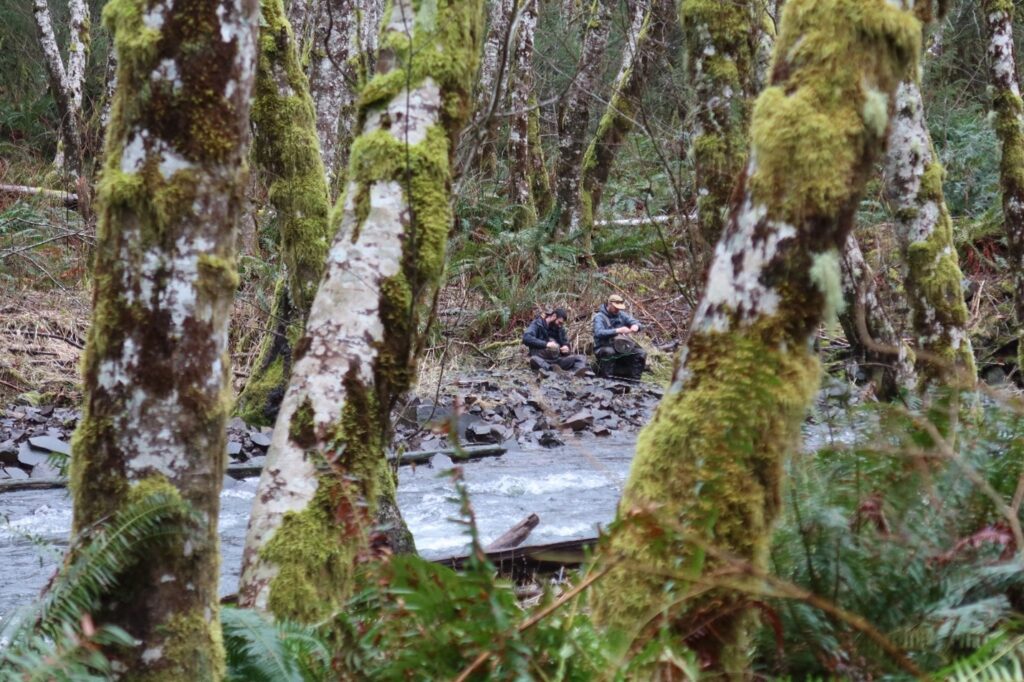
Image: James Fraser
Summary
The policy and budget achievements of the 2025 legislative session will benefit Oregon’s rivers and wild steelhead, salmon, and trout. Many thanks to all the TU members and supporters who helped with our advocacy!
In 2026, the Oregon legislature will hold a “short session” likely focused on budget matters and time-sensitive policy concerns; TU will be engaged and we encourage you to reach out to us with questions or if you’re interested in supporting our efforts.
James Fraser is the Oregon Policy Director at Trout Unlimited and can be contacted at james.fraser@tu.org
